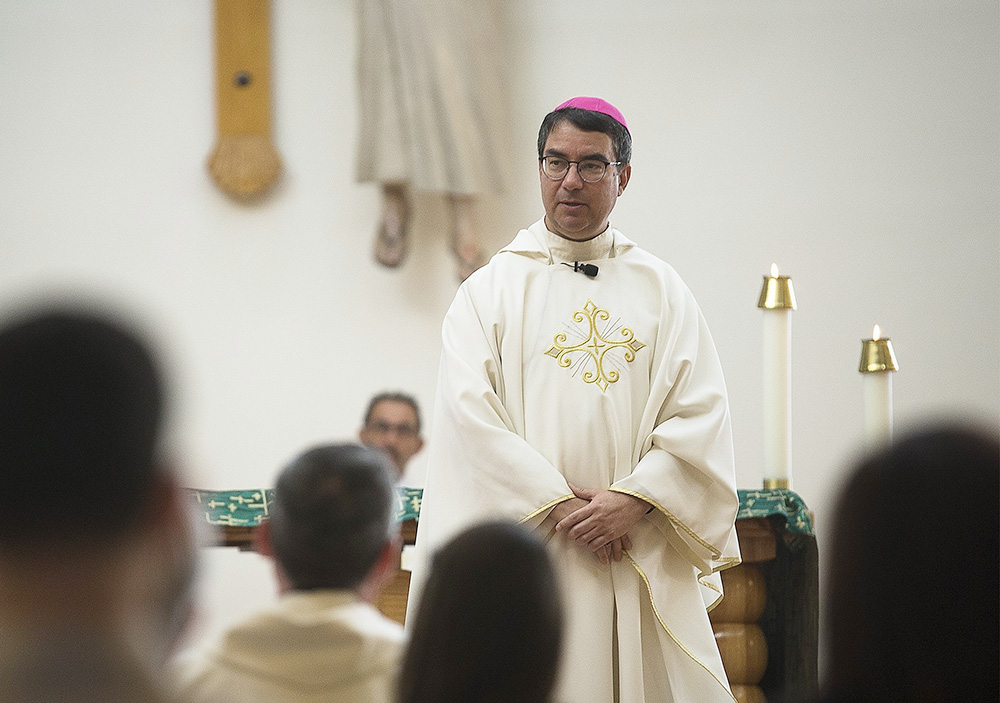
Bishop Oscar Cantú of San Jose, California, is seen in a Sept. 24, 2019, file photo. (CNS/Tyler Orsburn)
Bishop Oscar Cantú of San Jose, California said he hadn't been described as a U.S.-born Latino bishop in years. And yet, he has relatively few similar peers in the U.S. Conference of Catholic Bishops.
In 2020, the Associated Press reported that there were about 3,000 Hispanic priests based in the U.S., out of a total of roughly 37,300 American clerics. But of those Hispanic priests, more than 2,000 were born outside the U.S., a number that includes many priests who came to the U.S. specifically for their ministry. Both dynamics also affect the U.S. bishops' conference.
As a U.S.-born Hispanic priest, Cantú said, "I think we have a distinct opportunity to be bridges from the historical institutional church in the United States to a growing population whose voice has not always been asked for, whose experiences and opinions have not always been sought."
Cantú, who has been the bishop of San Jose since 2019, told NCR in a Nov. 16 interview on the sidelines of the U.S. bishops' meeting in Baltimore that a lack of representation can cause a repeating negative feedback loop.
"When they don't see someone like themselves in those roles, they don't imagine themselves in those roles," he said of U.S.-born Latinos.
Advertisement
Cantú said the church needs "to lift up those who are already in those roles as examples and to be intentional about that."
Cantú, who grew up in Houston in a working-class family, said he understands another barrier to the priesthood for U.S.-born Latinos: the economic pressure to support family. "We need to work on changing those expectations and that element of the culture," he said of the expectation to economically support parents as they age.
Asked about the ongoing consultation process for Pope Francis' Synod of Bishops, Cantú drew a parallel between the synod and the Fifth National Encuentro of Hispanic/Latino Ministry, hosted by the U.S. church from 2014 to 2018. He called the encuentro "a tremendously positive experience," and said "we need to follow up on that."
In San Jose's own synodal process, Cantú said, "the feedback that we got was right in line with the feedback that was received across the country." People who participated were "surprised and pleased" to be asked for input, he said.
Cantú described San Jose as a "very multiethnic and multicultural diocese." But the participants in the synodal listening sessions were "primarily English speakers, white, retired, highly educated and wealthy," he said.
"Perhaps they had more time," Cantú mused, explaining that he had asked pastors to frame synodal participation as an invitation, not a requirement.
"We continue not only to speak of synodality, but to look for ways to implement it," said Cantú.
"We find ourselves asking new questions," he continued, speaking about seeking "constituent" input on diocesan schools, catechesis and finances.
Cantú said that the smaller group conversations at the bishops' meeting this year — the bishops sat at small tables together, instead of in rows facing the dais — were an example of growing synodality, especially because it was a change conference members had asked for.
Beyond the new style of discussion at the bishops' meeting, Cantú said he thought the conference could expand its emphasis on synodality by asking presbyteral councils in dioceses for their input.
Cantú pointed out that the bishops are "constantly" listening to the bishops' conference staff, who are mostly laypeople. "It's not that we're not listening, but can we widen the circle as to who we listen to?" he asked.
Addressing a concern about the synod that another bishop had brought up during the assembly that "all voices would be sort of flattened without distinguishing the voice of the bishops," Cantú pointed to three words Francis frequently uses for the synod: "encounter, listen and discern."
Within discernment, Cantú said, "the voice of the magisterium ... remains unchanged."
"That listening piece and encountering piece does add color to and depth to our [voice], not so much what we teach, but how we teach," he said.





